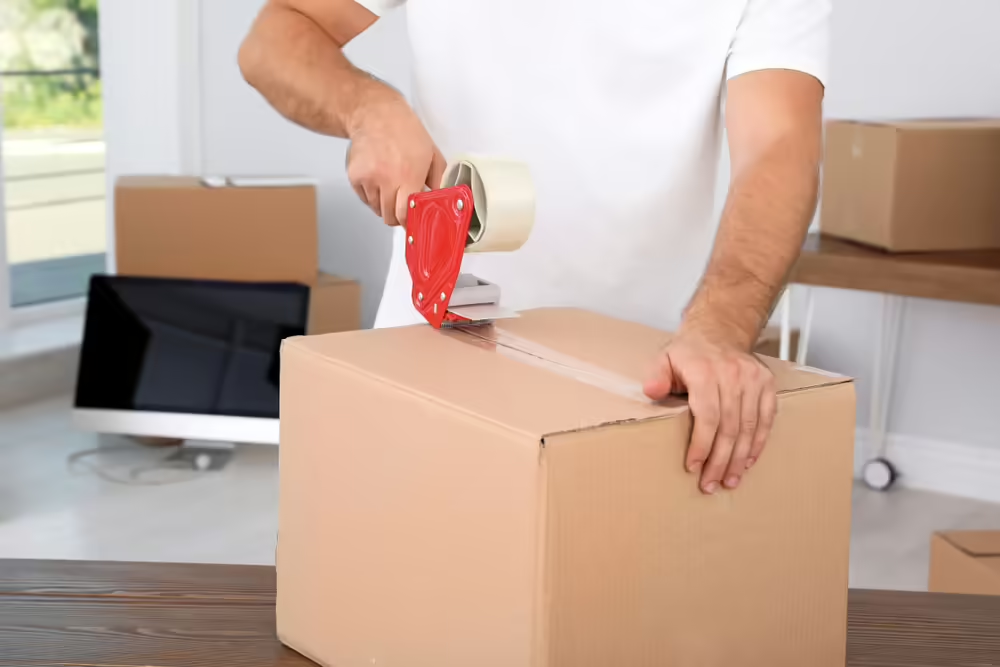Relocating can be a chaotic whirlwind, but understanding how movers pack your stuff can bring a sense of calm. Letting go of control and trusting strangers with your prized possessions can feel unnerving. This is where the magic of professional packers comes in. Knowing what to expect can ease those pre-move jitters. This post explores all facets of professional packing, making sure you’re well-equipped to handle this vital part of your moving journey.
Choosing professional packing entails hiring skilled movers who employ effective strategies to ensure your possessions are packed safely and arrive in good condition. This service is especially useful for individuals with hectic schedules because it relieves the stress of packing and allows you to focus on other important duties.
Packing can be time-consuming and difficult, but professionals simplify the process, avoid last-minute packing turmoil, and use their knowledge to handle fragile things and maximize box space. They may even provide unpacking services in your new home, making the move even easier.

Types Of Professional Packing Services
Packing services are available in a variety of ways to meet different needs. Movers provide full-service packing, which includes everything from packing your complete home to providing all necessary materials, such as boxes and bubble wrap. This comprehensive service allows you to relax while specialists handle all aspects of the packing procedure. However, it tends to be more expensive than partial packing.
Partial packing provides a more flexible alternative by letting you to select specific items or regions of your home for expert packing. This could imply seeking assistance with fragile or difficult objects while packing your clothes and books yourself. This method combines professional support and personal involvement, usually at a reduced cost.
What To Expect On Packing Day
On packing day, a crew leader will inspect your home to establish the number of belongings you’re moving and address any special requirements you may have. When the team arrives, they will bring all essential packing materials and will need clear access to the locations they will be working in. They often begin in less-used rooms and go to high-traffic areas, meticulously wrapping each item to avoid damage.
As they pack, the movers will mark each box so that everything is easily recognized and organized for unpacking. Keeping key goods, documentation, and jewels distinct from the rest of your belongings is critical for increased security, even if movers are generally trustworthy.
To make the packing process easier, purge and dispose any unnecessary stuff. Make clean passageways for easier access, and store any valuables or vital documents you’ll need throughout the relocation. If possible, disassemble furniture ahead of time to save time, though the packing staff can typically handle it. Organizing and preparing ahead of time makes the packing process go more smoothly and efficiently.
Things Movers Won’t Pack
You can’t pack everything for a move. Movers typically avoid transporting perishable foods, cleaning supplies, plants, and flammable items (like paint thinners). These are often considered safety hazards and could cause damage to other belongings during transport.
This list may also include liquids, medications, and personal hygiene items, not only because of spills and messes, but because they often are needed during and right after your relocation. This ensures everyone’s safety. But these aren’t hard and fast rules. Every professional packing service is different. Check with your chosen company for a complete list of restricted items.
Factors Influencing Cost of Packing
The cost of professional packing services varies depending on numerous criteria. The volume of your belongings is an important consideration—packing a larger home will cost more than packing a smaller apartment because of the extra time and resources required. Furthermore, the type of service you select influences the cost; full-service packaging is more expensive than partial packing.
Long-distance migrations typically result in increased packing costs due to the necessity for additional protection and travel fees. It’s best to get many estimates to compare pricing and services. To save money, consider packing less fragile goods yourself, such as clothes and books. Packing services typically cost roughly $1,000. However, this can vary depending on the volume and weight of your belongings, as well as any other services required.
How To Select The Right Packing Service
To get the best packing service, thoroughly investigate moving firms that meet your needs and budget. Check reviews, compare expertise, and weigh your options. Customer testimonials can provide significant information about the company’s reputation and dependability.
Review the company’s customer service and policies. Inquire about the compensation for damages, packer training, and insurance coverage. Being proactive in these areas ensures that your valuables are handled carefully and that you select a trustworthy business for a seamless packing process.
Don’t hesitate to ask questions or raise concerns with the moving company. Feeling comfortable and informed about how your belongings are handled is important. Additionally, consider tipping your movers around 5% of the total moving bill, typically distributed among the workers, with some preferring to give half upfront.
To ensure a smooth moving process, create an inventory of your belongings. Although movers will make their own list, having your own can be useful for tracking items and for potential insurance claims. Clearly communicate any special instructions, such as priority boxes you want to unpack first in your new home. Don’t hesitate to ask the movers for clarification if you have questions or concerns.
Do you need furniture movers in Philadelphia? Understanding how movers pack your belongings helps you prepare for a less stressful move. For more information on moving, contact Stellar Movers today.

